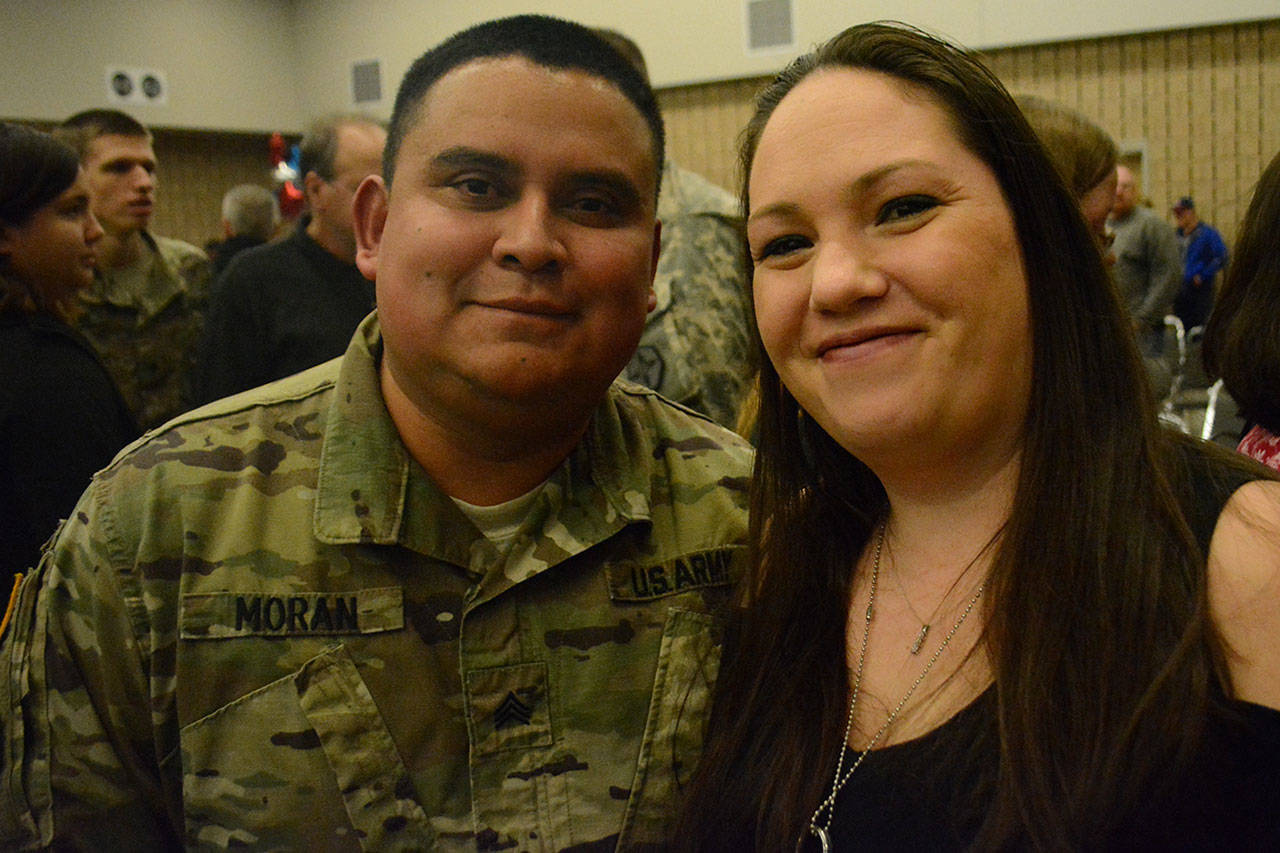MARYSVILLE – Carlos Moran works for Diamond Parking, but that’s not who he is.
“He’s a soldier. That’s who he is,” his wife, Kristina, said Feb. 2. She and dozens of others were at a ceremony at the Marysville Armed Forces Reserve Center, giving a sendoff to the 477th Transportation Company. The 100-member company is going to Kuwait in support of Operation Enduring Freedom “Spartan Shield.”
Sgt. Moran was deployed to Iraq in 2006-07. He had only joined the Army Reserves a year before.Moran, a big-rig mechanic, learned a few weeks ago he was going again, although, “We always know it’s a possibility,“ Kristina said.
Army Reserves are on Ready Force-X status, where select units are called up for mobilization in less than 120 days, meaning they have to be ready, trained and available to deploy within that timeframe, public affairs officer MaryJane Porter said.
Kristina said they have four kids, ages 5-14, and they “took it about as well as could be expected.”She said they have a great attitude about it.
“When dad leaves, that means somebody else gets to come home,” she said. “It’s all our kids have ever known. It’s his turn to go with his job. That’s what they do.”
Meanwhile, Maria Barajas of Ellensburg, a stay-at-home mom, also is going and will be a cook.
Joseph Dearmas of Anacortes, an HVAC technician, will do that same job overseas.
“We’ll be each others’ favorites,” they joked, providing food and air conditioning to each other.
Barajas, 30, has been in the Army Reserves for 10 years, and this is her first deployment.
Dearmas, 23, just joined last year and got married recently.
“I was in a bad place and wanted to stabilize,” he said, on why he joined, adding his relatives have all been in the service.
Barajas said it’s a “double whammy” for her family, as her sister, who is 1 1/2 years younger, is deployed, too.
Both said they are well-prepared. “I’m ready to go,” Dearmas said.
Barajas added, “Let’s get it done.”
Commander only 27
Lt. Jacob Brewer, 27, the commander of the 477th, addressed the company at the ceremony.This will be, “One of the biggest sacrifices of your lives,” he told the soldiers and their families.
One of his biggest concerns is for “families to stay strong.” He knows separations are hard on families, and he told those left behind about experts locally who can help them. “People you can rely on,” he said.
Even the event’s prayer asked for relationships to avoid harm.
Other leaders said: Because of improved technology and fewer restrictions on soldiers it is easier than ever to keep track of loved ones back home. Families need to understand what resources are available to them because “not knowing what’s going on” is harder for the family because the soldiers keep so busy. Do not be afraid to ask for help before a problem becomes a crisis.
Brewer, who just led a command in the Middle East a year ago, told the company, “This has the potential to be the best year of your life.”
Brewer’s family has a history of military service. He always knew he would have a military career. He grew up in Spokane, went to Eastern Washington University in ROTC and graduated as an officer.
It was a hard decision for he and his wife to have him volunteer to go back to the Middle East after having just a year at home after his last stint there.
“It’s a decision we made together. It’s critical for my career,” he said. “We don’t often have the opportunity to do something that matters.”
He said when someone becomes an officer, “It’s all about the soldiers.” He said he is in the “sweet spot” as an officer because he gets to know all of his soldiers. His training is all about stress management. “Every family member is stressed,” he said, adding he’s also trained in how to identify suicide risks. He said the Army is trying to get past the stigmatism of not asking help. “Everybody gets in trouble sometime,” he said, adding soldiers have to find a balance.
It even happened to him last time when he was in Iraq. He had the hardest time dealing with problems back home, especially after working 36 hours in a row. “What could possibly be that hard going on at home?” he recalls himself thinking.
3rd deployment
Merle McLain will be Brewer’s first lieutenant with the company. He has been in the Army for 30 years, and this will be his third deployment.
His wife of 20 years has been through this before but his twins haven’t. Well, they were 15-months-old the last time, and his son wasn’t even born yet.
McLain said his wife is well-prepared for the separation. She has always been involved in discipline of the three kids and also with doing things like the bills.
“It was set up years ago by design,” he said. Most of the soldiers, especially on their first deployment, haven’t done that. “It’s new territory for them,” he said.
So he sits down with each one and helps them set professional and personal goals for this “growth opportunity.”
Like the other leaders he tells his soldiers to “stay as connected as possible” with their families. He called it “way different” than is used to be staying in touch via Skype and other internet technologies. “It can be so hard when we get wrapped up in the day to day,” he said. “But we can’t forget back home.”
He said youth today get a bad rap. Many put their lives on hold, whether college students or those with careers.
“We get the best young people” to put on a uniform, he said.



